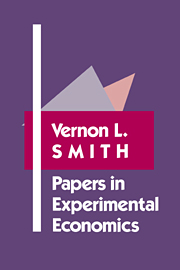Book contents
- Frontmatter
- Contents
- Preface
- Acknowledgments
- Part I The Formative Years
- Introduction
- 1 An Experimental Study of Competitive Market Behavior
- 2 Effect of Market Organization on Competitive Equilibrium
- 3 Nature, the Experimental Laboratory, and the Credibility of Hypotheses
- 4 Experimental Auction Markets and the Walrasian Hypothesis
- 5 Experimental Studies of Discrimination versus Competition in Sealed-Bid Auction Markets
- 6 Experimental Economics: Induced Value Theory
- 7 Bidding and Auctioning Institutions: Experimental Results
- 8 Intertemporal Competitive Equilibrium: An Empirical Study of Speculation
- 9 Experimental Economics at Purdue
- Part II Institutions and Market Performance
- Part III Public Goods
- Part IV Auctions and Institutional Design
- PART V Industrial Organization
- Part VI Perspectives on Economics
5 - Experimental Studies of Discrimination versus Competition in Sealed-Bid Auction Markets
Published online by Cambridge University Press: 06 July 2010
- Frontmatter
- Contents
- Preface
- Acknowledgments
- Part I The Formative Years
- Introduction
- 1 An Experimental Study of Competitive Market Behavior
- 2 Effect of Market Organization on Competitive Equilibrium
- 3 Nature, the Experimental Laboratory, and the Credibility of Hypotheses
- 4 Experimental Auction Markets and the Walrasian Hypothesis
- 5 Experimental Studies of Discrimination versus Competition in Sealed-Bid Auction Markets
- 6 Experimental Economics: Induced Value Theory
- 7 Bidding and Auctioning Institutions: Experimental Results
- 8 Intertemporal Competitive Equilibrium: An Empirical Study of Speculation
- 9 Experimental Economics at Purdue
- Part II Institutions and Market Performance
- Part III Public Goods
- Part IV Auctions and Institutional Design
- PART V Industrial Organization
- Part VI Perspectives on Economics
Summary
INTRODUCTION
In this study, attention focuses on the behavior of a class of auction markets where formal organization requires the individual competing bidders to submit one or more written “sealed bids” specifying the quantity and price at which they are committed to buy (or sell) units of the item being traded.
In many such markets only a single unit, such as a contract for the construction of a bridge or building, is involved. The experimental designs and theory underlying this study assume that many units of the item are to be offered for sale (or are required to be purchased). Perhaps the most important continuing market having this structure is the auction market for new Treasury bills with maturities of 91 and 182 days. Other examples might be the letting of contracts for transportation service, where the service requirements are in excess of the capacity of any single firm, or the letting of material contracts, say for cement, where the requirements exceed the capacity of any one producer.
Our primary purpose is to study individual bidding behavior and price determination under two alternative forms of market organization: (1) price discrimination, under which successful individual bids are filled at their bid prices, and (2) pure competition, under which successful individual bids are filled at the same market-clearing price.
- Type
- Chapter
- Information
- Papers in Experimental Economics , pp. 71 - 99Publisher: Cambridge University PressPrint publication year: 1991



